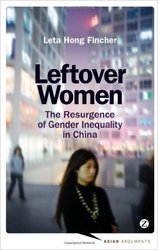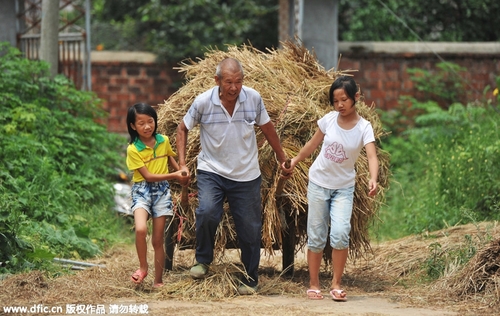As the editor of ZGBriefs, I have to (get to, really) scan and read dozens of news articles out of China each week. One of the things that enables me to do is spot emerging narratives.
Lately I’ve noticed a spate of stories that refer to some segment of the Chinese population as being “left-behind” or “left-over.”
The “left-over” label was first used to describe young women who were still not married by the time they were in their late twenties (or beyond). Here’s a video clip explaining the phenomenon:
Another good resource on this topic is the book Left-over Women: The Resurgance of Gender Inequality in China, by Leta Hong Fincher.
But wait a minute, you might be saying; doesn’t China have a gender imbalance such that there are millions more boys being born than girls? If that’s the case, aren’t there going to be left-over men?
In September the China Daily reported that by the end of 2014, the male population outnumbered the female population by 33.76 million.
This prompted Xinhua News to declare that China’s big demographic problem is left-over men, not left-over women. What’s on Weibo translated and highlighted some of the article:
"Leftover women are no cause for concern—it is the ‘leftover men’ that are China’s real crisis”, Xinhua News and Beijing News write earlier this week. “Marriage as a traditional institute is of great significance and value, but it should not be the way to measure a woman’s worth in today’s era,” the article states. Although it has been the unmarried young women, often called ‘leftover women’ (shèngnǚ, 剩女), who have been singled out by Chinese media, the article says that it really is the single men, referred to as ‘leftover men‘ (shèngnán, 剩男) that are at the center of China’s “marriage crisis”.
The Beijing News, according to What’s on Weibo, also points out part of the problem lies in a gap between background:
But, Beijing News writes, if you leave the gender bias aside, the so-called ‘leftover women crisis’ is not a crisis at all. If one looks at China’s single women and single men, there is a huge gap in their background and situation. The ‘leftover woman’ generally refers to a relatively successful “urban, professional female in her late twenties or older who is still single” (Fincher 2014, 2), who has the “three highs” (三高): high income, high education and high IQ. But ‘leftover men’ are at the other side of the social spectrum, as they generally have the so-called “three lows” (三低): low income, low education and low IQ.
Then there are the left-behind children (as many as 60 million), those whose parents have moved to the cities in search of work, The plight of these children was highlighted last summer when four children, living on their own in squalor, committed suicide by drinking pesticide. An article in The Telegraph tells their story, and the story of other children like them:
Fourteen-year-old Zhou couldn’t go on. He had spent the last few months looking after his three younger siblings in the remote village of Cizhu in Bijie, southern China, while their parents worked earning money for the family hundreds of miles away.
Leaving a note behind thought to be to his parents that read:“Thanks for your kindness. I know you mean well for us, but we should go now,” he swigged from a bottle of pesticide and handed it to his sisters, aged five, eight and nine, who did the same.
And in October, The Economist published an article called "Little Match Children," showing how these left-behind children are one of the hidden costs of China’s economic growth.
And finally, on October 21, the China Daily ran a poignant series of photos highlighting the plight of China’s left-behind seniors:
The Chongyang Festival, which people traditionally mark by honoring the elderly and paying their respects to them, falls today, or the 9th day of the 9th lunar month. On this special day, let's take a look at lives of some left-behind seniors in rural areas.
Now, who did we leave out?
Header and text image credits: chinadaily.com.cn.

Joann Pittman
Joann Pittman is Vice President of Partnership and China Engagement and editor of ZGBriefs. Prior to joining ChinaSource, Joann spent 28 years working in China, as an English teacher, language student, program director, and cross-cultural trainer for organizations and businesses engaged in China. She has also taught Chinese at the University …View Full Bio
Are you enjoying a cup of good coffee or fragrant tea while reading the latest ChinaSource post? Consider donating the cost of that “cuppa” to support our content so we can continue to serve you with the latest on Christianity in China.

